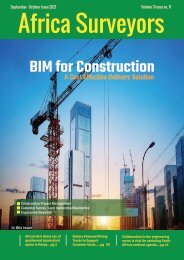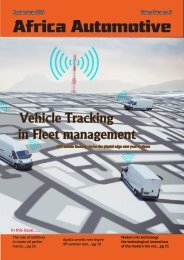Africa Surveyors November-December 2022 digital issue
Africa Surveyors is Africa’s premier source of Surveying, Mapping and Geospatial news and an envoy of surveying products/service for the Construction, Maritime, Onshore & Offshore energy and exploration, Engineering, Oil and Gas, Agricultural and Mining sectors on new solution based trends and technology for the African market.
Africa Surveyors is Africa’s premier source of Surveying, Mapping and Geospatial news and an envoy of surveying products/service for the Construction, Maritime, Onshore & Offshore energy and exploration, Engineering, Oil and Gas, Agricultural and Mining sectors on new solution based trends and technology for the African market.
You also want an ePaper? Increase the reach of your titles
YUMPU automatically turns print PDFs into web optimized ePapers that Google loves.
OPINION
Meeting the need for skills and labour
to solve South Africa’s intensifying
energy crisis
“
Renewable energy
is the quickest and
most cost-effective
way to address the
country’s crisis
Wayne Alcock
Managing Director
Quyn International Outsourcing
By Wayne Alcock
South Africa’s recent energy crisis escalation into
Level 5 and 6 load shedding has highlighted
the stark need for businesses, industries and
municipalities to generate their own power. Mines were
first to establish their own solar plants to secure power
supply. Today, municipalities have followed suit with
the unveiling plans for initiatives to secure their own
supply and to eliminate dependence on the incumbent
power producer by creating decentralised power
generation. Recent reports noted that eThekwini,
South Africa’s third biggest city will issue a request
for proposals to construct 400 megawatts of power
generation capacity later this year or early in 2023. The
experts in alternative energy will need to be called in
to handle the planning, development, construction and
maintenance of these supply plants. This is good news
for South Africans as it will mean a significant increase
in the need for labour and skills specific to the energy
sector, as other industries and municipalities follow suit,
working to become more energy self-sufficient.
Desperate times
Eskom is currently responsible for meeting 95% of
South Africa’s demand for electricity. In September 2022,
Eskom started implementing Stage 6 power cuts which
meant businesses and homes were forced to go without
electricity for more than 10 hours a day. The company has
since reduced the severity of load shedding, vacillating
between Stages 2 and 3, depending on the time of
day. However, it’s not a simple case of being without
power. Rolling blackouts also affect the delivery of other
services, including water supply in some areas, resulting
in ‘water shedding’. With South Africa’s economy already
14 November-December issue l 2022 www.africasurveyorsonline.com

















